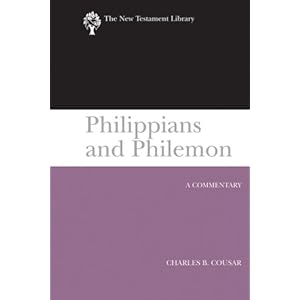 Charles B. Cousar
Charles B. CousarFriday, July 16, 2010
Book Notice: Philippians & Philemon by Charles Cousar
 Charles B. Cousar
Charles B. CousarPhilippians and Philemon: A Commentary
NTL; Louisville, KY: Westminster John Knox, 2009.
Available from Amazon.com in the USA and Alban Books in the UK.
Charles Cousar has done several works on Paul including an introduction to Paul's letters, Paul's theology of the cross, and a commentary on Galatians. This volume is a very brief but readable commentary on Philippians and Philemon that situates them both in the context of Paul's Ephesian ministry in the mid-50s.
In the introduction, Cousar is uneasy about the purported compilation theories where Philippians is made up of several letters that have been synthetically compiled into one. He thinks, with M.D. Hooker, that it easier to attribute the sudden changes in the letter to Paul himself than to an editor. On the place and date of writing, I was pleasantly surprised and glad to see that Cousar assigns it an Ephesian provenance. He is correct in that it is hard to reconcile Paul's view in Romans that he has no further work left to do in the eastern regions (Rom. 15.22-29) and hold to Paul's intent to visit Philippi after his release from imprisonment Rome (Phil. 2.24). That would mean dating Philippians 52-55 AD. Cousar believes that the primary purposes of Philippians are (1) to report on his situation in captivity to relieve the anxiety of the Philippians; (2) express gratitude for their recent gift through Epaphroditus; (3) to commend Epaphroditus to them; and (4) to encourage them to remain united in the face of opposition. On the Christ Hymn, Cousar rightly regards its purpose as an ethical exhortation to humility. He rejects a strictly Adamic reading of the hymn where Christ is another Adam who does not seek equality with God, but humbles himself as the true bearer of God's image. Cousar notes that morphe is not strictly synonymous for eikon and what Jesus grasped after seems to be something that he already had, but did not exploit, rather than something that he grasped after. He regards the passage as allowing for a "traditional reading of the preexistence of Christ". Cousar also regards Paul's boast in Phil. 3.4-6 as including his inherited credentials and achieved credentials. The soteric imagery indicates that "Being incorporated into Christ" is the vantage point from which he now sees himself. I also agree with Cousar that dia pisteos Christou can serve as a shorthand for the obedient self-surrender of Jesus. On Philemon, Cousar also assigns it to Ephesus in the mid-50s. I concur with Cousar's reconstruction of the situation that Philemon is not a runaway slave, but is an estranged slave seeking the help of his master's friend to be reconciled.
I have to say that this volume is rather terse compared to other volumes in the NTL series. It is only 106 pages long and the Philemon commentary is only five and a half pages! Though I have to say that it is an easy read, gives opinions on all the disputed matters in a concise way, and I agree with nearly all of Cousar's opinions on the critical issues. So despite its brevity, it does have some value. But there is no escaping the fact that it looks like this volume is out of place in the NTL series esp. when compared to the far more thorough volume on Colossians by Jerry Sumney. I still prefer the Philippians commentaries by Bockmuehl, O'Brien, Fee, and Hooker, but this one will sit nicely on the shelf.
Subscribe to:
Post Comments (Atom)




No comments:
Post a Comment